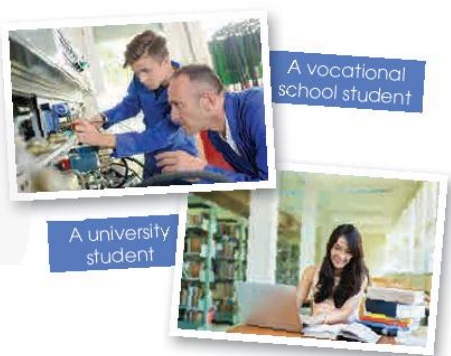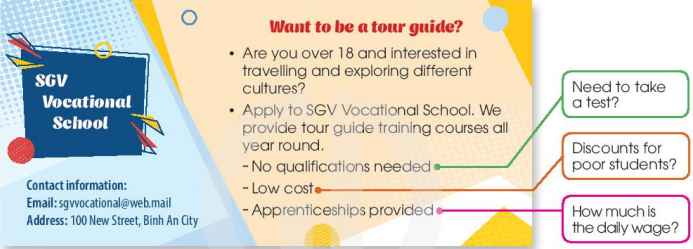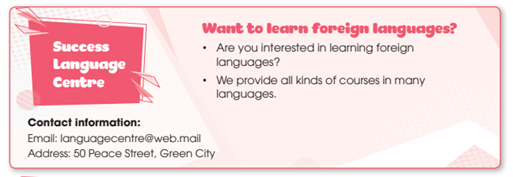Giải SGK, SBT Unit 7. Education options for school-leavers Global Success
Giải SGK, SBT Unit 7 Global Success
2. Read the conversation again. Decide whether the following statements are true (T) or false (F).
(Đọc đoạn hội thoại một lần nữa. Quyết định xem những câu sau đây là đúng (T) hay sai (F).)
|
|
T |
F |
|
1. School-leavers only have the option of academic education. |
|
|
|
2. Good grades at school can help students get into university. |
|
|
|
3. Vocational schools are for those who want to develop job skills. |
|
|
|
4. Nam wants to work at his father’s car repair shop after leaving school |
|
3. Find phrases in the conversation that mean the following.
(Tìm các cụm từ trong đoạn hội thoại có nghĩa như sau.)
|
1. an event at which students can talk to representatives of universities or vocational schools about their study options. |
|
|
2. an exam that someone takes to be accepted into a school or university |
|
|
3. Studying at school or university to gain knowledge and develop thinking skills. |
|
|
4. a place that teaches skills needed for particular jobs. |
|
Completing your education
(Hoàn thành giáo dục của bạn)
1. Match the words and phrase with their meanings.
(Nối các từ và cụm từ với ý nghĩa của chúng.)
|
1. school-leaver (n) |
a. education at a college or university |
|
2. vocational education (np) |
b. the act of completing a university degree or a course of study |
|
3. higher education (n) |
c. a person who has just left school |
|
4. qualification (n) |
d. Education that prepares students for work in a specific trade |
|
5. graduation (n) |
e. an official record showing that you have finished a training course or have the necessary skills, etc |
2. Read the article. Match the highlighted words with their meanings.
(Đọc bài viết. Nối các từ được đánh dấu với ý nghĩa của chúng.)
THE EDUCATIONAL JOURNEY FOR SCHOOL-LEAVERS
This month, Teen Talk magazine has received many letters from secondary school students asking about the different options for school-leavers. We've talked to educational experts, and they think that young people should either continue their studies at a college or university or go to a vocational school.
A. ______________________
Higher education is really for people who want formal learning in order to get an academic degree. If you are good at certain subjects and need a degree related to those subjects, then university is the right choice for you. Besides studying, university students also have the opportunity to live independently, make new friends, and join different clubs. Many students still manage to work part-time during their university years. In addition, college or university students usually have an advantage over students from vocational schools when it comes to further studies after a degree. They will also have broader career options and an advantage in the job market.
B. ______________________
If you are not interested in traditional academic subjects and want to work in a specific trade, then vocational education is the right choice for you. You will gain the practical skills and knowledge necessary for a specific job. In addition, a vocational school may also offer you an apprenticeship. This type of training not only provides students with hands-on experience, but also gives them wages to cover their living costs. Most importantly, vocational training is usually much shorter than a college or university course. After getting their vocational qualifications, graduates can immediately start work and earn a salary.
There are a lot of educational opportunities for school-leavers today. You can choose from hundreds of vocational schools or higher education institutions to continue your educational journey.
|
1. formal |
a. a job that requires special training and skills |
|
2. manage |
b. a period of time working for and leaning from a skilled person |
|
3. trade |
c. to succeed in doing something difficult |
|
4. apprenticeship |
d. important organisations that have a particular purpose |
|
5. institutions |
e. received in a school, college, or university, with lessons, exams, etc. |
4. Read the article again and complete each gap with ONE word.
(Đọc bài viết một lần nữa và hoàn thành mỗi khoảng trống với MỘT từ.)
|
College or university |
Vocational school |
|
For students who want (1) _____________ Get a (2) _____________ related to an academic subject Join different clubs |
For students who want to work in a specific (3) _____________ Can offer an (4) ____________ Finish their (5) ___________ quickly and start earning a salary. |
Vocational training vs. academic study
(Đào tạo nghề và nghiên cứu học thuật)
1. Work in pairs. Complete the table below. Use the suggested ideas and / or your own ideas.
(Làm việc theo cặp. Hoàn thành bảng dưới đây. Sử dụng các ý tưởng gợi ý và/hoặc ý tưởng của riêng bạn.)
Suggested ideas: (Ý tưởng đề xuất)
• develop critical thinking skills
(phát triển kỹ năng tư duy phản biện)
• develop research skills
(phát triển kỹ năng nghiên cứu)
• provide shorter duration of study
(cung cấp thời gian học ngắn hơn)
• develop practical skills
(phát triển các kỹ năng thực tế)
|
Benefits of vocational training |
Benefits of academic study |
|
cost less _____________________________________ _____________________________________ |
can earn more _____________________________________ _____________________________________ |
4. Listen to the conversation again and complete the notes below. Use no more than TWO words for each gap.
(Nghe đoạn hội thoại một lần nữa và hoàn thành các ghi chú dưới đây. Sử dụng không quá HAI từ cho mỗi chỗ trống.)
|
ABC Vocational School (Trường Dạy Nghề ABC) |
|
|
Courses (Các khóa học) |
Tour guide training, hotel and restaurant management, cooking, etc. (Đào tạo hướng dẫn viên du lịch, quản lý nhà hàng khách sạn, nấu ăn, v.v.) |
|
Types of cooking courses (Các loại khóa học nấu ăn) |
Short courses: (Khóa học ngắn hạn) - for all ages and abilities (cho mọi lứa tuổi và khả năng) - duration: two or three (1) ________ (thời lượng: hai hoặc ba ________) (2) __________ courses: (__________ khóa học) - for people training to be (3) ________ (để mọi người được đào tạo ________) - duration: two years (thời hạn: hai năm) |
|
Hands-on experience (Kinh nghiệm thực tế) |
Work as a(n) (4) _________ in a real restaurant (Làm việc với tư cách là (n) _________ trong một nhà hàng thực sự) |
|
Information about the school (Thông tin về trường ) |
Parents and students can study the (5) __________ (Phụ huynh và học sinh có thể tìm hiểu __________) |
1. Read the text and complete the table below with information from the text. Use no more than TWO words or a number in each gap.
(Đọc văn bản và hoàn thành bảng dưới đây với thông tin từ văn bản. Sử dụng không quá HAI từ hoặc một số trong mỗi khoảng trống.)
UK EDUCATION AFTER SECONDARY SCHOOL
In the UK, students can choose to end their formal education at 16, but in England they must stay in full-time education or do a training course until the age of 18.
Many 16-year-old students go on to study at different vocational colleges. Vocational education usually lasts up to three years. During this time, students learn job-specific skills. That is why vocational education is often referred to as career education or technical education. Many students still go on to higher education after receiving their vocational qualifications.
Alternatively, students can go toa sixth-form college or stay at their secondary school if it offers a sixth form for two more years. Students usually focus on three or four subjects that they are interested in or related to the degree they want to study at university. Exams are taken at the end of the two-year course, and the grades are used to apply for university courses. Not all students leaving sixth form go to university. Some prefer to get into a vocational course or find a job.
At university, students study for at least three years in order to get a bachelor’s degree. After the first degree, they can study for one to two years to get a master’s degree, and three to five years to get a doctorate.
|
UK education after secondary school |
|
|
Age at end of formal education |
- 16 in the UK - stay until the age of (1) ________ in full-time education or do training in England |
|
Vocational education |
- lats up to three years - also called career education or (2) _________ - some students still go on to (3) _________ |
|
Sixth form |
- lasts two years - students study subjects they are interested in or subjects related to higher education. - grades are used to apply for (4) _________ |
|
University education |
students study to get a (5) ________, a master’s degree, or a doctorate |
Complete the text. Use the correct form of the words and phrase in the box.
(Hoàn thành văn bản. Sử dụng hình thức đúng của các từ và cụm từ trong hộp.)
|
school-leaver apprenticeship higher education graduation institution |
Nowadays, there are educational opportunities available to all (1) ______________. If they want to earn an academic degree, they can continue their studies at (2) ________ institutions. But if they want to gain practical and job-specific skills then vocational education is the perfect choice for them. At vocational schools, they can also do (3) ____________ and learn from skilled people on the job. Having qualifications from good educational (4) ____________helps young people find jobs immediately after (5) ______________.
1. Find the following words in the word search.
(Tìm các từ sau trong tìm kiếm từ.)
|
vocational apprentice institution qualification graduation academic trade professional |























